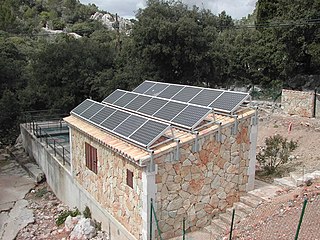
Environment friendly processes, or environmental-friendly processes, are sustainability and marketing terms referring to goods and services, laws, guidelines and policies that claim reduced, minimal, or no harm upon ecosystems or the environment.
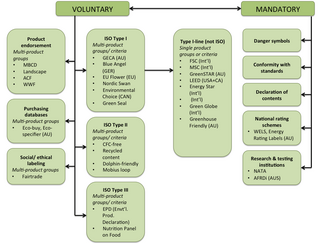
Ecolabels and Green Stickers are labeling systems for food and consumer products. The use of ecolabels is voluntary, whereas green stickers are mandated by law; for example, in North America major appliances and automobiles use Energy Star. They are a form of sustainability measurement directed at consumers, intended to make it easy to take environmental concerns into account when shopping. Some labels quantify pollution or energy consumption by way of index scores or units of measurement, while others assert compliance with a set of practices or minimum requirements for sustainability or reduction of harm to the environment. Many ecolabels are focused on minimising the negative ecological impacts of primary production or resource extraction in a given sector or commodity through a set of good practices that are captured in a sustainability standard. Through a verification process, usually referred to as "certification", a farm, forest, fishery, or mine can show that it complies with a standard and earn the right to sell its products as certified through the supply chain, often resulting in a consumer-facing ecolabel.

Fortum Oyj is a Finnish state-owned energy company located in Espoo, Finland. It mainly focuses on the Nordic region. Fortum operates power plants, including co-generation plants, and generates and sells electricity and heat. The company also sells waste services such as recycling, reutilisation, final disposal solutions and soil remediation and environmental constructions services, and other energy-related services and products e.g. consultancy services for power plants and electric vehicle charging. Fortum is listed on the Nasdaq Helsinki stock exchange.
Renewable Energy Certificates (RECs), also known as Green tags, Renewable Energy Credits, Renewable Electricity Certificates, or Tradable Renewable Certificates (TRCs), are tradable, non-tangible energy certificates in the United States that represent proof that 1 megawatt-hour (MWh) of electricity was generated from an eligible renewable energy resource and was fed into the shared system of power lines which transport energy. Solar renewable energy certificates (SRECs) are RECs that are specifically generated by solar energy.
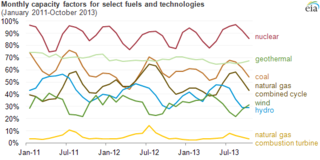
The net capacity factor is the unitless ratio of actual electrical energy output over a given period of time to the theoretical maximum electrical energy output over that period. The theoretical maximum energy output of a given installation is defined as that due to its continuous operation at full nameplate capacity over the relevant period. The capacity factor can be calculated for any electricity producing installation, such as a fuel consuming power plant or one using renewable energy, such as wind, the sun or hydro-electric installations. The average capacity factor can also be defined for any class of such installations, and can be used to compare different types of electricity production.
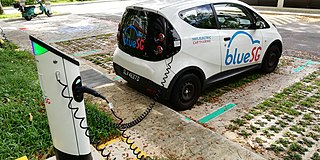
Clean technology, in short cleantech or climatetech, is any process, product, or service that reduces negative environmental impacts through significant energy efficiency improvements, the sustainable use of resources, or environmental protection activities. Clean technology includes a broad range of technology related to recycling, renewable energy, information technology, green transportation, electric motors, green chemistry, lighting, grey water, and more. Environmental finance is a method by which new clean technology projects can obtain financing through the generation of carbon credits. A project that is developed with concern for climate change mitigation is also known as a carbon project.
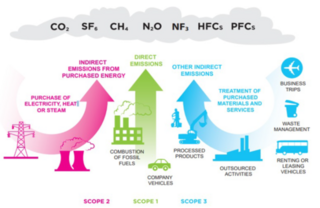
Carbon accounting is a framework of methods to measure and track how much greenhouse gas (GHG) an organization emits. It can also be used to track projects or actions to reduce emissions in sectors such as forestry or renewable energy. Corporations, cities and other groups use these techniques to help limit climate change. Organizations will often set an emissions baseline, create targets for reducing emissions, and track progress towards them. The accounting methods enable them to do this in a more consistent and transparent manner.
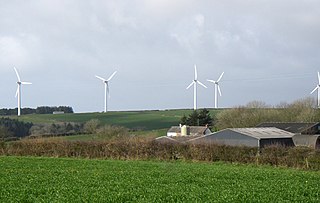
Renewable energy in the United Kingdom contributes to production for electricity, heat, and transport.
A Guarantee of Origin is an energy certificate defined in article 19 of the European Directive 2018/2001/EC. A GO certifies attributes of electricity, gas, heating and cooling, especially coming from renewable sources and provides information to energy customers on the source of their energy. Guarantees of Origin are the only defined instruments evidencing the origin of electricity generated from renewable energy sources.

Solar power consists of photovoltaics (PV) and solar thermal energy in the European Union (EU).
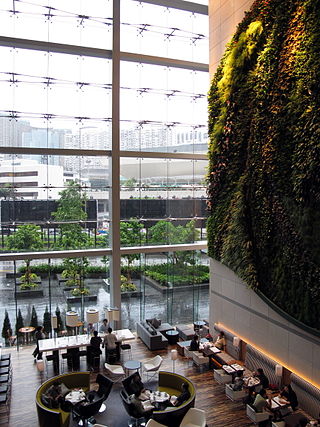
An eco hotel, or a green hotel, is an environmentally sustainable hotel or accommodation that has made important environmental improvements to its structure in order to minimize its impact on the natural environment. The basic definition of an eco-friendly hotel is an environmentally responsible lodging that follows the practices of green living. These hotels have to be certified green by an independent third-party or by the state they are located in. Traditionally, these hotels were mostly presented as ecolodges because of their location, often in jungles, and their design inspired by the use of traditional building methods applied by skilled local craftsmen in areas, such as Costa Rica and Indonesia.
The Renewable Energy Certificate System (RECS) was a voluntary system for international trade in renewable energy certificates that was created by RECS International to stimulate the international development of renewable energy. It advocated the use of a standard energy certificate to provide evidence of the production of a quantity of renewable energy and provided a methodology that enables renewable energy trade, enabling the creation of a market for renewable energy and so promoting the development of new renewable energy capacity.

100Green, operating as Green Energy (UK) Ltd, is a British independent energy company based in Ware, Hertfordshire. It was established in 2001 by CEO Douglas Stewart. The company provides Ofgem-certified renewable electricity and green gas to a variety of customers, including homes, businesses, and organizations throughout England, Wales, and Scotland. It is currently the only energy supplier in the UK to offer 100% green gas.
Sustainable products are products who are either sustainability sourced, manufactured or processed that provide environmental, social and economic benefits while protecting public health and environment over their whole life cycle, from the extraction of raw materials until the final disposal.

Energy in Belarus describes energy and electricity production, consumption and import in Belarus. Belarus is a net energy importer. According to IEA, the energy import vastly exceeded the energy production in 2015, describing Belarus as one of the world's least energy sufficient countries in the world. Belarus is very dependent on Russia.
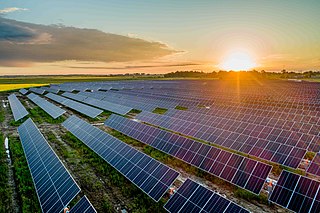
Renewable energy in Lithuania constitutes some energy produced in the country. In 2016, it constituted 27.9% of the country's overall electricity generation. Previously, the Lithuanian government aimed to generate 23% of total power from renewable resources by 2020, the goal was achieved in 2014 (23.9%).
Renewable energy in Chile is classified as Conventional and Non Conventional Renewable Energy (NCRE), and includes biomass, hydro-power, geothermal, wind and solar among other energy sources. Usually, when referring to Renewable Energy in Chile, it will be the Non Conventional kind.

Energy in Liechtenstein describes energy production, consumption and import in Liechtenstein.
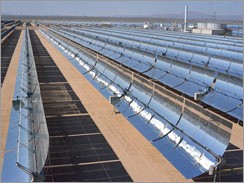
A consumer green energy program is a program that enables households to buy energy from renewable sources. By allowing consumers to purchase renewable energy, it simultaneously diverts the utilization of fossil fuels and promotes the use of renewable energy sources such as solar and wind.

Sustainable Development Goal 7 is one of 17 Sustainable Development Goals established by the United Nations General Assembly in 2015. It aims to "Ensure access to affordable, reliable, sustainable and modern energy for all." Access to energy is an important pillar for the wellbeing of the people as well as for economic development and poverty alleviation.


















